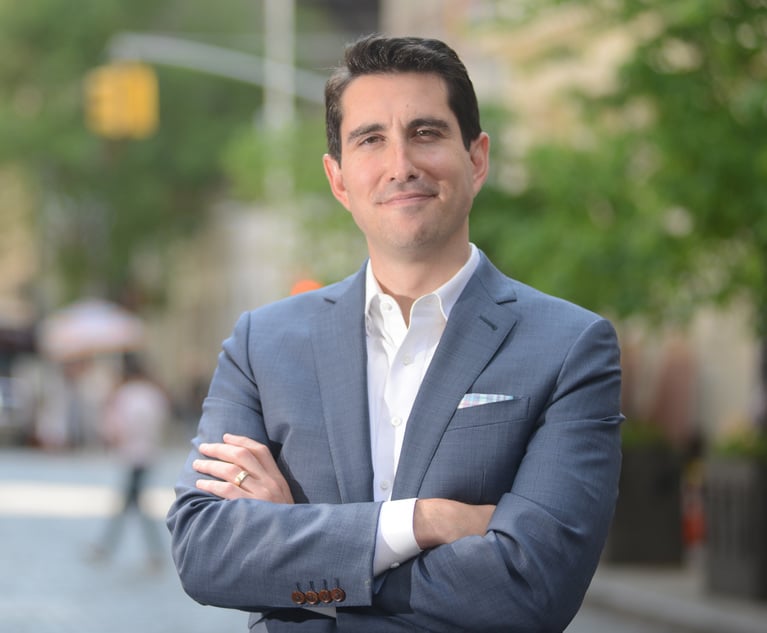Lawyers React to California Attorney General's Submission for Final CCPA Regulations
"The attorney general is supposed to pass regulations that address exceptions under state and federal laws, including intellectual property rights," Michelle Hon Donovan, a partner at Duane Morris in San Diego, explained. "There is an exception that talks about trade secret rights, but nothing about IP rights."
June 03, 2020 at 04:44 PM
3 minute read
 Data privacy
Data privacy
California Attorney General Xavier Becerra submitted the final regulations for the enforcement of the California Consumer Privacy Act this week to be approved by the California Office of Administrative Law despite compliance concerns caused by the new coronavirus and ambiguities in those regulations.
The CCPA was passed into law in 2019 and came into effect in January. Becerra indicated that enforcement of the law would begin on July 1. Becerra has published proposed regulations throughout the year and attorneys who are familiar with the law said it is not as clear as they would like it to be.
Michelle Hon Donovan, a partner at Duane Morris in San Diego, said it is still unclear how privacy rights and intellectual property rights will work together. She said if there is not an exception for intellectual property rights, companies could face a situation where an individual or organization claims intellectual property rights over IP that has already been claimed.
"The attorney general is supposed to pass regulations that address exceptions under state and federal laws, including intellectual property rights," Donovan explained. "There is an exception that talks about trade secret rights, but nothing about IP rights."
Reece Hirsch, a partner at Morgan, Lewis & Bockius in San Francisco, said during an interview on Wednesday that one of the ambiguities in the final proposed regulations includes the lack of an opt-out button that was provided in prior versions of the proposed regulations.
Over the next month, Hirsch said companies should make sure they have a CCPA-compliant website privacy notice.
"Similarly, if a business engages in the sale of personal information but does not have a 'do not sell my personal information' link on their website, that is an obvious deficiency," Hirsch said.
He also said companies should check their service provider agreements. Under the regulations, sharing personal information with a service provider constitutes a sale of personal information.
Hirsch said companies would benefit from additional guidance beyond what is in the plain language of the law. He also said he hopes enforcement does not begin July 1, even if it is approved.
"I would hope the attorney general's office would exercise its discretion and not launch into enforcement actions immediately," Hirsch said.
The final regulations were submitted just one month before enforcement is slated to begin. The regulations will need to be approved by the Office of Administrative Law first. The office would normally have 30 workdays to approve the regulation. However, because of the new coronavirus, California Gov. Gavin Newsom allowed the agency an additional 60 calendar days to approve regulations. Hirsch said Becerra has asked that the CCPA be made a priority.
Donovan further explained that any regulations filed June 1 or later will not go into effect until Oct. 1. She said she would expect Becerra to file for an exemption to have the regulations come into effect on July 1.
Companies have previously asked the attorney general to push back the enforcement date to Jan. 1, 2021, citing complications caused by COVID-19. Becerra has expressed that he will not push back the enforcement date of the CCPA.
This content has been archived. It is available through our partners, LexisNexis® and Bloomberg Law.
To view this content, please continue to their sites.
Not a Lexis Subscriber?
Subscribe Now
Not a Bloomberg Law Subscriber?
Subscribe Now
NOT FOR REPRINT
© 2025 ALM Global, LLC, All Rights Reserved. Request academic re-use from www.copyright.com. All other uses, submit a request to [email protected]. For more information visit Asset & Logo Licensing.
You Might Like
View All
Kraken’s Chief Legal Officer Exits, Eyes Role in Trump Administration
3 minute read

Collectible Maker Funko Wins Motion to Dismiss Securities Class Action

How Tony West Used Transparency to Reform Uber's Toxic Culture
Law Firms Mentioned
Trending Stories
- 1States Accuse Trump of Thwarting Court's Funding Restoration Order
- 2Microsoft Becomes Latest Tech Company to Face Claims of Stealing Marketing Commissions From Influencers
- 3Coral Gables Attorney Busted for Stalking Lawyer
- 4Trump's DOJ Delays Releasing Jan. 6 FBI Agents List Under Consent Order
- 5Securities Report Says That 2024 Settlements Passed a Total of $5.2B
Who Got The Work
J. Brugh Lower of Gibbons has entered an appearance for industrial equipment supplier Devco Corporation in a pending trademark infringement lawsuit. The suit, accusing the defendant of selling knock-off Graco products, was filed Dec. 18 in New Jersey District Court by Rivkin Radler on behalf of Graco Inc. and Graco Minnesota. The case, assigned to U.S. District Judge Zahid N. Quraishi, is 3:24-cv-11294, Graco Inc. et al v. Devco Corporation.
Who Got The Work
Rebecca Maller-Stein and Kent A. Yalowitz of Arnold & Porter Kaye Scholer have entered their appearances for Hanaco Venture Capital and its executives, Lior Prosor and David Frankel, in a pending securities lawsuit. The action, filed on Dec. 24 in New York Southern District Court by Zell, Aron & Co. on behalf of Goldeneye Advisors, accuses the defendants of negligently and fraudulently managing the plaintiff's $1 million investment. The case, assigned to U.S. District Judge Vernon S. Broderick, is 1:24-cv-09918, Goldeneye Advisors, LLC v. Hanaco Venture Capital, Ltd. et al.
Who Got The Work
Attorneys from A&O Shearman has stepped in as defense counsel for Toronto-Dominion Bank and other defendants in a pending securities class action. The suit, filed Dec. 11 in New York Southern District Court by Bleichmar Fonti & Auld, accuses the defendants of concealing the bank's 'pervasive' deficiencies in regards to its compliance with the Bank Secrecy Act and the quality of its anti-money laundering controls. The case, assigned to U.S. District Judge Arun Subramanian, is 1:24-cv-09445, Gonzalez v. The Toronto-Dominion Bank et al.
Who Got The Work
Crown Castle International, a Pennsylvania company providing shared communications infrastructure, has turned to Luke D. Wolf of Gordon Rees Scully Mansukhani to fend off a pending breach-of-contract lawsuit. The court action, filed Nov. 25 in Michigan Eastern District Court by Hooper Hathaway PC on behalf of The Town Residences LLC, accuses Crown Castle of failing to transfer approximately $30,000 in utility payments from T-Mobile in breach of a roof-top lease and assignment agreement. The case, assigned to U.S. District Judge Susan K. Declercq, is 2:24-cv-13131, The Town Residences LLC v. T-Mobile US, Inc. et al.
Who Got The Work
Wilfred P. Coronato and Daniel M. Schwartz of McCarter & English have stepped in as defense counsel to Electrolux Home Products Inc. in a pending product liability lawsuit. The court action, filed Nov. 26 in New York Eastern District Court by Poulos Lopiccolo PC and Nagel Rice LLP on behalf of David Stern, alleges that the defendant's refrigerators’ drawers and shelving repeatedly break and fall apart within months after purchase. The case, assigned to U.S. District Judge Joan M. Azrack, is 2:24-cv-08204, Stern v. Electrolux Home Products, Inc.
Featured Firms
Law Offices of Gary Martin Hays & Associates, P.C.
(470) 294-1674
Law Offices of Mark E. Salomone
(857) 444-6468
Smith & Hassler
(713) 739-1250






